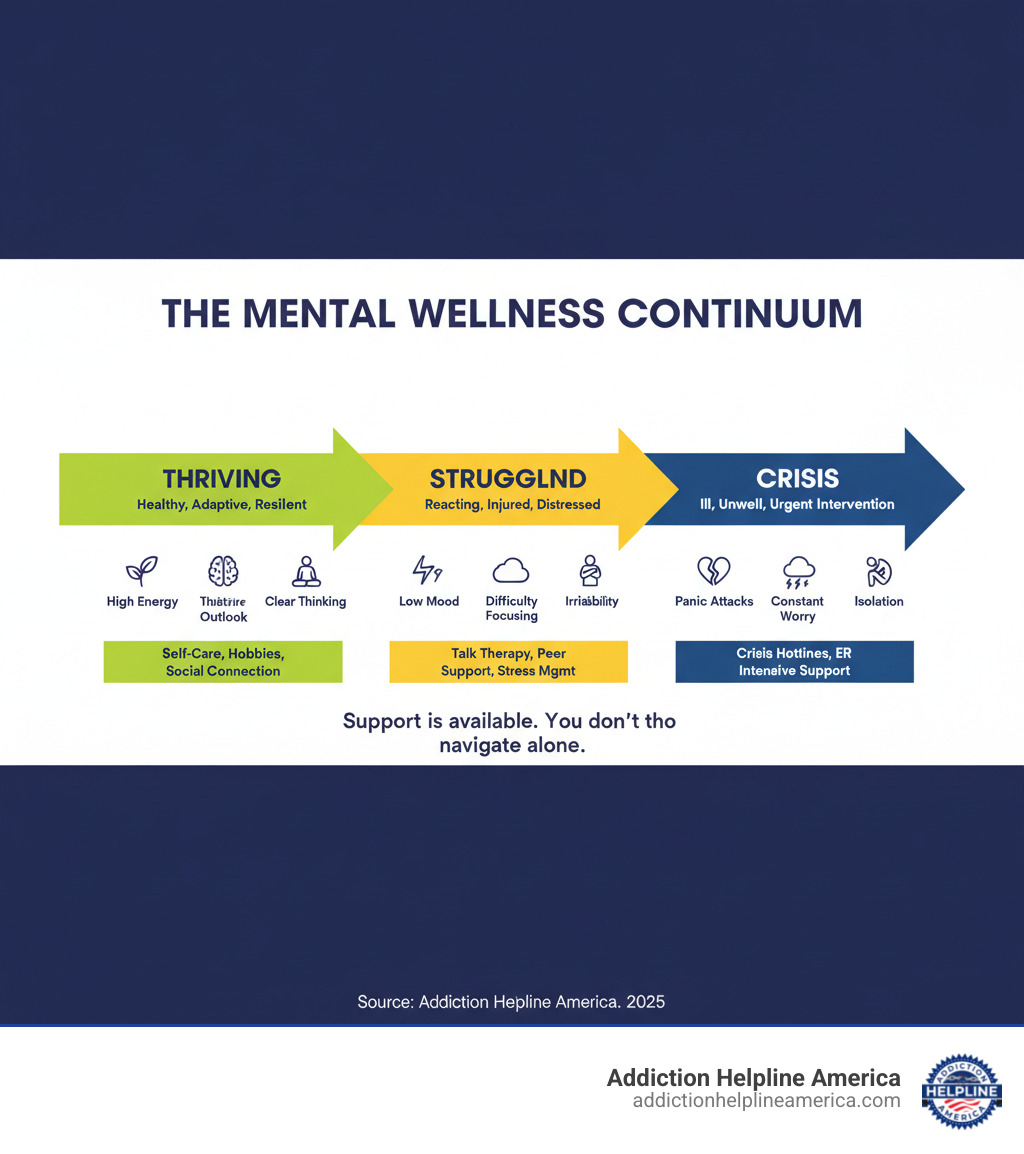
Why Mental Wellness Support Matters for Everyone
Mental wellness support includes all the resources and strategies that help you maintain psychological well-being through life’s challenges. Whether you feel overwhelmed or just want to improve your coping skills, understanding your options is the first step toward balance.
Support can include professional services like therapy, self-care practices, peer support groups, and specialized resources for different communities. Many options are free, low-cost, virtual, or available without a referral.
Mental wellness isn’t about being happy all the time. It’s about managing well in daily life through both good and bad times. Your mental health exists on a continuum, shifting based on factors like genetics, life experiences, and physical health. Just like physical health, it requires ongoing care.
The good news is that help is available and accessible. You don’t need to feel “sick enough” to reach out, and you don’t have to steer these challenges alone.
At Addiction Helpline America, we connect individuals and families to vital mental wellness support resources, understanding that addiction and mental health are deeply interconnected. Our mission is to provide compassionate, confidential guidance to anyone seeking improved well-being.
Mental wellness support helpful reading:
Understanding Mental Wellness and Its Influences
Mental wellness is not the absence of mental illness; it’s your overall psychological well-being and ability to manage life’s ups and downs. Everyone has mental health, and it exists on a continuum that shifts throughout life. Some days you may be thriving, while on others you may be struggling. Both are normal parts of being human.
Several interconnected factors influence your mental wellness:
- Genetics can create predispositions that affect how you process emotions.
- Life experiences, especially trauma, shape how you cope with stress.
- Physical health has a major impact. Chronic pain or illness can affect your mood.
- Living circumstances like your work, relationships, and financial stability contribute to your sense of security.
- Daily events, both positive and negative, can impact your mental reserves.
Understanding these influences allows for a holistic approach to mental wellness support—nurturing your well-being across all areas of life.
The Role of Lifestyle and Physical Health
Your body and mind are deeply connected. Lifestyle choices can either support or undermine your mental wellness.
- Physical activity releases endorphins that boost mood and reduce stress. Even a 20-minute walk can make a difference.
- A balanced diet rich in fruits, vegetables, and lean proteins provides your brain with essential nutrients. For more guidance, you can find information on healthy eating.
- Good sleep hygiene is crucial. A consistent sleep schedule and a relaxing bedtime routine can transform how you feel during the day.
- Social connections with friends, family, and community are fundamental. Meaningful relationships provide a sense of belonging and support.
Practical Self-Care and Coping Strategies
Having practical strategies in your toolkit is an essential form of mental wellness support.
- Mindfulness and Meditation: These practices involve being present in the moment without judgment. They can help you develop a calmer state of mind. Apps like Headspace or Guided Mind can help you start.
- Breathing Exercises: Deep, controlled breathing can activate your body’s relaxation response and calm your nervous system almost instantly.
- Taking Breaks: Short breaks throughout the day and longer periods of rest are necessary to prevent burnout and reset your mind.
- Hobbies: Engaging in activities you enjoy provides an outlet for creativity and stress relief.
- Managing Social Media: Be intentional about your time on social media to protect your mental peace from comparison and anxiety.
- Self-Compassion: Treat yourself with the same kindness you would offer a friend. Acknowledging your struggles without self-criticism is key to healing.
Explore different approaches to find what works for you. For a comprehensive look at various strategies, you can explore wellness modules.
Recognizing the Need for Professional Support
Sometimes, self-care isn’t enough. Recognizing when you or a loved one needs professional mental wellness support is a brave and crucial step toward healing.
How do you know when it’s time? Look for these signs, especially if they are persistent and interfere with daily life:
- Persistent sadness or low mood
- Withdrawing from people and activities you once enjoyed
- Extreme mood swings
- A feeling that everyday tasks are impossible
- Dramatic changes in sleep or appetite
- Increased anxiety, frequent panic attacks, or a constant sense of dread
- Thoughts of self-harm or suicide (This requires immediate help. Do not wait.)
These signs aren’t weaknesses; they are signals that your mind needs care.
Taking the first steps can feel daunting, but it starts with acknowledging you’re struggling. Admitting you need help is wisdom, not weakness. Next, try talking to someone you trust, like a friend, family member, or partner. Voicing your feelings can lift some of the burden and help you feel less alone.
From there, reaching out to a professional is the natural next step. Therapy and counseling offer significant benefits:
- Gain perspective on your situation with a trained professional.
- Learn practical, evidence-based coping skills custom to your needs.
- Process past trauma in a safe, confidential space.
- Improve your relationships by better understanding yourself.
- Start on a journey of personal growth and build genuine resilience.
Recovery is not just possible—it’s happening every day for people who took that first step. If you’re ready to explore your options, we’re here to help. Learn how to get help and find the mental wellness support that’s right for you.
Navigating Your Options for Mental Wellness Support
You’ve recognized that you need help—that’s the hardest part. Now comes the next step: finding the right kind of mental wellness support for your unique situation. The variety of options means there is a path that will work for you. A stepped care approach can be helpful, where you start with simpler options like a support group and move to more specialized services if needed.
At Addiction Helpline America, our mission is to help you steer these choices. We connect people to a vast network of mental health treatment centers, offering personalized, confidential, and free guidance.
We also know cost is a concern. Free and low-cost options are available, such as community health centers with sliding-scale fees, non-profit organizations, and university psychology clinics. The rise of virtual support has also made care more accessible and often more affordable, removing barriers like transportation and distance. For help finding what you need, check out our guide to find reliable resources.
Types of Professional Mental Wellness Support
Professional mental wellness support comes in different forms to meet you where you are.
Counseling and Therapy: This involves working one-on-one with a licensed professional (like a psychologist or licensed counselor) who uses evidence-based techniques to help you develop healthier coping strategies. You can find a provider through government resources like FindSupport.gov, by asking your primary care physician for a referral, or by checking with your insurance company.
Support Groups: These peer-led gatherings offer the power of shared experience. In a judgment-free space, you can share stories and learn from others facing similar struggles. Organizations like NAMI (National Alliance on Mental Illness) provide free peer-support services nationwide.
Peer Support: This connects you with a trained individual who has lived experience with mental health challenges. They offer empathy, practical guidance, and hope.
Crisis Hotlines: For immediate, 24/7 help, these lifelines are staffed by trained professionals and volunteers.
- 988 Suicide & Crisis Lifeline: Call or text 988 or chat at 988lifeline.org.
- Veterans Crisis Line: Call 988 and press 1 or text 838255.
- Disaster Distress Helpline: Call or text 1-800-985-5990.
- SAMHSA’s National Helpline: Call 1-800-662-HELP (4357) for treatment referral.
- National Domestic Violence Hotline: Call, text “START” to 88788, or chat online.
- National Sexual Assault Hotline: Available by phone and online chat.
- National Human Trafficking Hotline: Call 1-888-373-7888.
- National Child Abuse Hotline: Call or text 1-800-4AChild (1-800-422-4453).
- National Center for Missing & Exploited Children: Call 1-800-THE-LOST (1-800-843-5678).
For more details, explore our guide to treatment options.
Finding Specialized Mental Wellness Support
Your background and circumstances shape what support works best.
- Youth and Students: Age-appropriate services are crucial for the unique pressures young people face. A pediatrician can be a good starting point, and the 988 Lifeline is available for youth in crisis.
- Seniors: Older adults may struggle with loneliness, grief, or health-related mental challenges. The Eldercare Locator connects seniors and families to services.
- Culturally Sensitive Support: Finding a provider who respects your cultural values, language, and traditions can make a significant difference in your comfort and healing.
- Support for Families: When one person struggles, the whole family is affected. Resources from organizations like NAMI and specialized hotlines can help family members.
- Residential Treatment: For co-occurring disorders or when intensive care is needed, residential centers provide a structured, 24/7 supportive environment focused on healing.
Frequently Asked Questions about Mental Wellness Support
What is the difference between a psychologist and a psychiatrist?
Understanding the difference can help you find the right mental wellness support.
Psychiatrists are medical doctors (MDs) who specialize in mental health. They can prescribe medication, order medical tests, and diagnose mental illness from a biological perspective. They are often involved when medication is part of a treatment plan.
Psychologists typically hold a doctoral degree (Ph.D. or Psy.D.) and are experts in talk therapy. They use evidence-based methods to help you understand thoughts, emotions, and behaviors and develop coping skills. They generally cannot prescribe medication.
Often, the best approach is collaborative care, where a psychiatrist manages medication and a psychologist provides regular therapy.
How can I find affordable mental health care?
Cost should not be a barrier to getting help. Here are several options for affordable mental wellness support:
- Community Health Centers: Many offer services on a sliding scale based on your income. Find one near you via the HRSA locator tool.
- Sliding-Scale Fees: Don’t hesitate to ask private therapists if they offer reduced rates based on income.
- University Clinics: Psychology or counseling departments at universities often provide low-cost therapy from graduate students under professional supervision.
- Non-Profit Organizations: Groups like NAMI offer free support groups and resources.
- Employee Assistance Programs (EAPs): Check if your employer offers a confidential EAP, which typically includes a set number of free counseling sessions.
- Virtual Support: Online counseling platforms and apps can be more affordable than traditional in-person therapy.
- Insurance: Understand your plan’s mental health benefits. Government sites like HealthCare.gov can help you find coverage if you need it. SAMHSA also offers guidance for those without insurance.
What are the benefits of joining a support group?
Support groups offer a unique form of mental wellness support by connecting you with people who have similar experiences. Key benefits include:
- Reducing Isolation: Realizing you are not alone in your struggles is incredibly powerful.
- Validation: Hearing others’ stories validates your own feelings and experiences.
- Peer Encouragement: Mutual support creates a sense of hope and accountability.
- Practical Strategies: You can learn coping techniques and resources from others who have “been there.”
- Judgment-Free Space: Groups provide a safe, confidential environment to share openly.
- Increased Self-Understanding: Reflecting with others helps you recognize patterns and gain new insights.
Organizations like NAMI offer free peer-support services, and virtual groups for various needs are widely available.
Conclusion
We’ve explored what mental wellness support means and the many pathways available to help you feel more balanced. The most important takeaway is that mental wellness is a journey, not a destination. It’s about building the skills and resources to manage life’s ups and downs.
Your mental health is as important as your physical health. Reaching out for help is a sign of strength, not weakness. It is an acknowledgment that you deserve support. Whether you start with self-care, talk to a loved one, or connect with a professional, any step forward is the right step.
At Addiction Helpline America, we understand that finding the right support can feel overwhelming. That’s why we’re here. We provide free, confidential, and personalized guidance, connecting you to quality treatment centers and mental health resources across the country. Our network includes comprehensive care options that address co-occurring mental health and addiction disorders.
Your journey toward better mental wellness doesn’t require a referral or a diagnosis. It just requires the decision to take the first step. You don’t have to take it alone.
Our helpline is 100%
free & confidential
If you or someone you care about is struggling with drug or alcohol addiction, we can help you explore your recovery options. Don’t face this challenge alone—seek support from us.
Programs
Resources
Will my insurance
cover addiction
treatment?
We're ready to help
Find the best
drug or alcohol treatment
center
Are you or a loved one struggling with addiction? Call today to speak to a treatment expert.
















